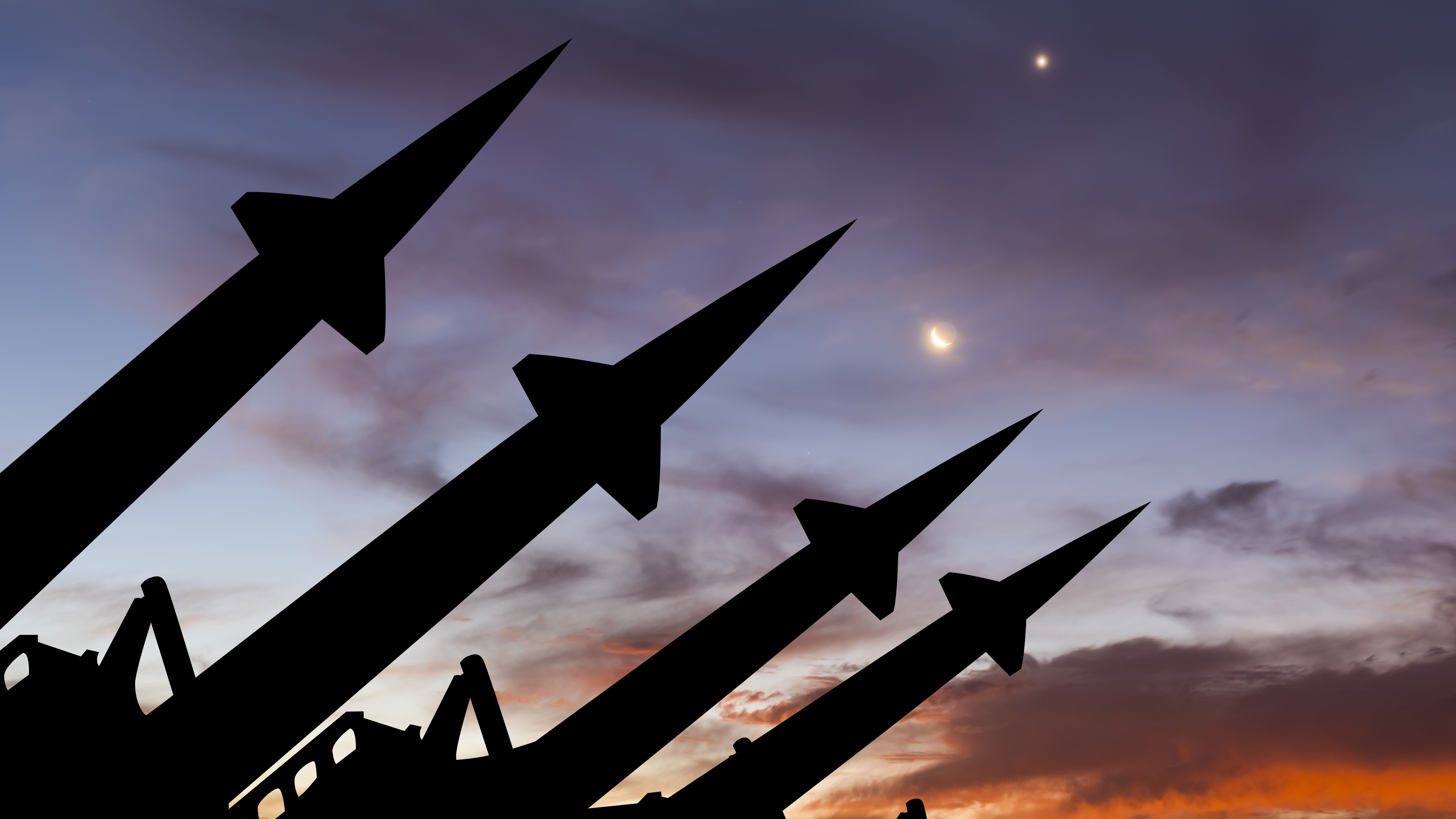Can anything stop a nuclear bomb?
Halting an atomic weapon is theoretically possible, say experts, but in reality is an enormous challenge

A free daily email with the biggest news stories of the day – and the best features from TheWeek.com
You are now subscribed
Your newsletter sign-up was successful
The Russian invasion of Ukraine has raised the fear of nuclear weapons to a level not seen since the Cold War.
Russia’s nuclear arsenal is believed to be the world’s largest, leaving President Vladimir Putin with some 5,977 nuclear warheads at his disposal, according to the Federation of American Scientists, compared with the US’s 5,428.
And Putin has signalled he is prepared “to resort to the most extreme level of brinkmanship” in an attempt to win victory in Ukraine, said The Guardian. He ordered his military to put Russia’s nuclear deterrence forces on high alert in February, soon after the war began.
The Week
Escape your echo chamber. Get the facts behind the news, plus analysis from multiple perspectives.

Sign up for The Week's Free Newsletters
From our morning news briefing to a weekly Good News Newsletter, get the best of The Week delivered directly to your inbox.
From our morning news briefing to a weekly Good News Newsletter, get the best of The Week delivered directly to your inbox.
It has left many wondering what could be done if a foreign military did launch an intercontinental ballistic missile (ICBM), and if such a weapon can be stopped once it has been fired.
Is it possible to intercept a nuclear missile?
It’s a question that engineers have been grappling with for decades, and yet “despite monumental advances in physics, computing and A.I.” in the last 40 years, “the engineering problem of missile interception has yet to be solved”, said Salon.
“There’s no law of physics against the prospect of intercepting them, but the laws of physics make it extremely challenging – and create all of these constraints on how difficult it is to intercept it,” James Wells, a professor of physics at the University of Michigan, told the magazine.
But it is physically possible to create a system that could intercept a missile – it’s just extremely difficult.
A free daily email with the biggest news stories of the day – and the best features from TheWeek.com
“There’s no theorem that says ‘one cannot accomplish missile defense’,” he added.
What are the problems that engineers encounter?
Among the reasons engineers have found the task so difficult is that such missiles are relatively small objects (a typical ICBM is about a metre long), they move very fast, and any interception needs to occur in such a small time frame.
Dr Laura Grego, from MIT’s Laboratory for Nuclear Security and Policy, told Salon that an armed ICBM attack would take place within about “30 or 40 minutes”, meaning any defence system would have to “be ready and effective on those timescales”. And because “the stakes are so high, it really needs to work almost perfectly the first time”.
To make matters more difficult, an ICBM can only be intercepted at certain points on its journey: when it launches, when it is out in space, and when it re-enters the atmosphere. Each of these phases “has its limitations”, said LiveScience.
During the launch phase, a country wishing to knock a nuclear bomb off course would have just a few minutes to respond. And countries that have historically been seen as a nuclear threat, such as Russia and China, “have large land masses”. This allows them to “keep their missiles far inland, meaning sea-based interceptors couldn’t get to a missile during its launch phase”.
And any intercepting missile would have to hit exactly the right spot on a nuclear bomb, or it could simply knock the missile off course and towards another, perhaps friendly, country. This is commonly known as the ‘shortfall’ problem. “You really have to be explicit and target the payload at the tip of the missile,” Grego told the site.
Trying to intercept a missile while it is in its next phase – when out in space – is also extremely difficult. This is because of the so-called “discrimination problem”. In the vacuum of space, where there is very little to no air resistance, it would be all but impossible to figure out which missiles are lighter, decoy missiles, and which are heavy warheads. Intercepting all the missiles to ensure you hit the real warhead might not be possible in such a limited time frame.
Can anything defend against a nuclear attack?
Despite these challenges, the US has spent decades trying to develop a system that could attack a nuclear bomb while it is outside the Earth’s atmosphere. The system is known as the Ground-based Midcourse Defense (GMD). Testing has produced mixed results, but some experts are convinced it could work effectively in an emergency scenario. It is, says Forbes, “the only U.S. military program capable of intercepting North Korean nuclear weapons headed for American soil”.
But GMD has its limitations. Since 1999, it has been tested 18 times, said The Verge, and has failed at least eight of those tests. And, noted the technology website, “the Union of Concerned Scientists argue that these were conducted under artificial conditions where the timing of the incoming missile, for example, was known in advance”.
A study published this year by the American Physical Society has brought the reliability of the system into question. The study, which focused on ICBMs from North Korea, concluded that the GMD couldn’t be relied upon to “counter even a limited nuclear strike” and said that the systems in place were “unlikely to achieve reliability within the next 15 years”.
-
 Political cartoons for February 16
Political cartoons for February 16Cartoons Monday’s political cartoons include President's Day, a valentine from the Epstein files, and more
-
 Regent Hong Kong: a tranquil haven with a prime waterfront spot
Regent Hong Kong: a tranquil haven with a prime waterfront spotThe Week Recommends The trendy hotel recently underwent an extensive two-year revamp
-
 The problem with diagnosing profound autism
The problem with diagnosing profound autismThe Explainer Experts are reconsidering the idea of autism as a spectrum, which could impact diagnoses and policy making for the condition
-
 Munich Security Conference: a showdown between Europe and Trump?
Munich Security Conference: a showdown between Europe and Trump?Today’s Big Question Report suggests European leaders believe they can no longer rely on the US for military support – but decoupling is easier said than done
-
 New START: the final US-Russia nuclear treaty about to expire
New START: the final US-Russia nuclear treaty about to expireThe Explainer The last agreement between Washington and Moscow expires within weeks
-
 What would a UK deployment to Ukraine look like?
What would a UK deployment to Ukraine look like?Today's Big Question Security agreement commits British and French forces in event of ceasefire
-
 The history of US nuclear weapons on UK soil
The history of US nuclear weapons on UK soilThe Explainer Arrangement has led to protests and dangerous mishaps
-
 Did Trump just end the US-Europe alliance?
Did Trump just end the US-Europe alliance?Today's Big Question New US national security policy drops ‘grenade’ on Europe and should serve as ‘the mother of all wake-up calls’
-
 Taiwan eyes Iron Dome-like defence against China
Taiwan eyes Iron Dome-like defence against ChinaUnder the Radar President announces historic increase in defence spending as Chinese aggression towards autonomous island escalates
-
 Is conscription the answer to Europe’s security woes?
Is conscription the answer to Europe’s security woes?Today's Big Question How best to boost troop numbers to deal with Russian threat is ‘prompting fierce and soul-searching debates’
-
 Trump peace deal: an offer Zelenskyy can’t refuse?
Trump peace deal: an offer Zelenskyy can’t refuse?Today’s Big Question ‘Unpalatable’ US plan may strengthen embattled Ukrainian president at home